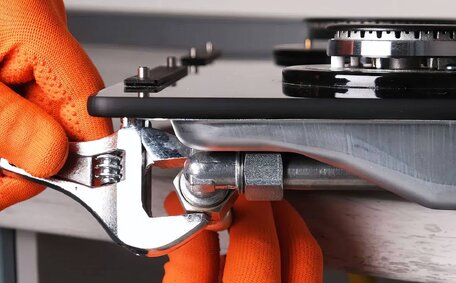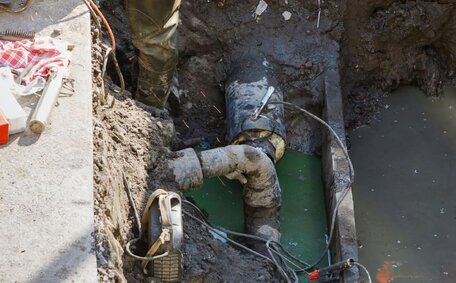
The role of gas fitting in kitchen renovations
When renovating your kitchen, it’s important to engage a licensed gas fitter to safely install, replace or alter any gas appliances and pipes. This ensures
Read MoreAccumulation of soil and sediment is a common cause of drain blockages and drainage complications. As leading Cecil Hills plumbers with years of experience, Our expertise reveals the significant impact of soil erosion and sedimentation on drainage systems, particularly after heavy rainfall.
When soil is washed away into waterways due to rain or erosion, this runoff carrying fine sediment can make its way into stormwater drains and sewers. Over time, the sediment accumulates and can cause restrictions in water flow, eventually blocking drains completely. Such blockages hinder wastewater draining, leading to backups and potential flooding, adversely affecting properties and infrastructure.
Excess sediment entering creeks and rivers can degrade water quality and harm aquatic habitats.
As leading experts in the Cecil Hills area, we are well-equipped to deal with blocked drains and related issues caused by soil and sediment intrusion. Whether it’s advising on preventative measures or clearing existing blockages, Our licensed technicians are equipped to ensure your drains remain free from sediment blockages.
Numerous sources are responsible for sediment accumulation that leads to blockages in Cecil Hills drains:
Runoff from roads, driveways, roofs, and other impervious surfaces collects dirt, debris, and pollutants, transporting them to storm drains. Urban runoff gradually carries fine sediment into drains, which then accumulates.
Erosion of exposed soil at local construction sites significantly contributes sediment to nearby stormwater systems. In the absence of effective controls, this runoff can pollute water and lead to drain blockages during rainfall.
Riverbank erosion naturally moves sediment into stormwater pipes and drainage systems. Excessive erosion exacerbates soil intrusion, especially after heavy rains.
Enhanced land management and sediment controls are critical in reducing these sediment sources to prevent drainage issues in Cecil Hills. Our expertise ensures we are fully adept at resolving blocked drains caused by accumulation that waterways can contribute to.
The introduction of excess sediment by waterways presents serious environmental concerns, beyond causing blocked drains. Sediment pollution causes increased turbidity, which drastically diminishes water quality in local water bodies.
Increased turbidity diminishes sunlight penetration, which hinders photosynthesis and aquatic plant growth. Murkier waters also impact aquatic life by clogging fish gills, smothering reefs and riverbeds, and transporting toxins that accumulate in sediment.
Such toxins can lead to algal blooms, depleting water bodies of oxygen. Sediment pollution has been linked to blue-green algae outbreaks, affecting ecosystems in water bodies like the Hawkesbury River and Botany Bay.
Mitigating soil erosion is crucial to prevent sediment-laden runoff into local waterways around our region. As leading Cecil Hills plumbers, we specialise in clearing blocked drains caused by excess soil while emphasising the importance of sediment control to clients for protecting water quality.
We leverage our extensive drainage expertise to offer professional guidance on erosion control and drain maintenance. Proper drainage is crucial for preserving waterway health, supporting local fishing, recreation, and other activities.
There are several key strategies for mitigating sediment pollution to prevent blocked drains in Cecil Hills:
Installing sediment barriers on construction sites and in urban areas captures eroding soil, especially during rainfall. Tools such as silt fencing, sediment traps, compost filter socks, and storm drain filters offer primary defence by slowing runoff and filtering sediment..
Utilising erosion control blankets or hydroseeding helps stabilise areas prone to erosion. This ensures soil stays in place rather than washing into nearby drains and waterways during intense rain.
Using treatments like vegetated swales, retention ponds, and infiltration trenches slows and filters runoff before it reaches drains. Regular maintenance ensures effectiveness.
Preserving or restoring vegetated riparian buffers along creeks and rivers helps filter runoff and reinforce shorelines against erosion during floods. Native plants best secure bank soil.
Checking and clearing drains before wet periods ensures sediment and debris accumulation won’t restrict water flow. Adequately sized drainage infrastructure also handles soil intrusion through greater runoff capacity.
Following Sydney’s Managing Urban Stormwater guidelines during development protects local water quality. As leading Cecil Hills plumbers, we’re here to advise on keeping soil in place while effectively managing excess sediment through well-designed drainage preserving local waterways.
As leading Cecil Hills plumbers dealing frequently with blocked drains, we recommend several best practises for preventing sediment intrusion over the long term:
Using appropriate materials and ensuring correct gradients in pipe installation reduces areas vulnerable to sediment deposition. We specialise in designing drainage matched to local soil/site conditions that withstands erosion.
Strategic placement of silt bags and sediment filters near drainage inlets at construction sites prevents soil runoff intrusion. Regular inspection and maintenance ensures continued effectiveness at capturing sediment.
Planting native grasses and plants in cleared riparian zones establishes natural filters that safeguard waterways. Deep root systems stabilise soil while stems/leaves intercept sediment from urban runoff.
Using erosion control mats, hydroseeding, and stabilisers during land rehabilitation protects erosion-prone areas from runoff. This prevents sediment pollution at the source.
Incorporating stormwater treatment solutions into development such as bioretention swales, retention basins and constructed wetlands slows/filters sediment-laden runoff before entering drains. Regular maintenance is key.
Preventive drain inspections and cleaning, especially before forecasted heavy rain, can avert blockages from sediment and debris. Using CCTV inspections further assesses sediment buildup to improve proactive cleaning.
As prominent stormwater management experts in Cecil Hills, we dedicate ourselves to collaborating with clients to implement control measures that effectively prevent soil runoff and drainage blockages.
When renovating your kitchen, it’s important to engage a licensed gas fitter to safely install, replace or alter any gas appliances and pipes. This ensures
Read MoreGas line repairs require a licensed plumber to locate any leaks, fix damaged pipes and fittings, and properly seal everything to prevent future issues. Contact our emergency plumbers for safe and proper gas line repairs.
Read MoreDuring emergency plumbing situations, crucial safety precautions include turning off the main water supply to prevent flooding, wearing protective gear to avoid injuries, clearing standing water to minimize damage, and calling a licensed professional plumber for assistance.
Read MoreCecil Hills, 2171 NSW
We will call back as soon as possible.




